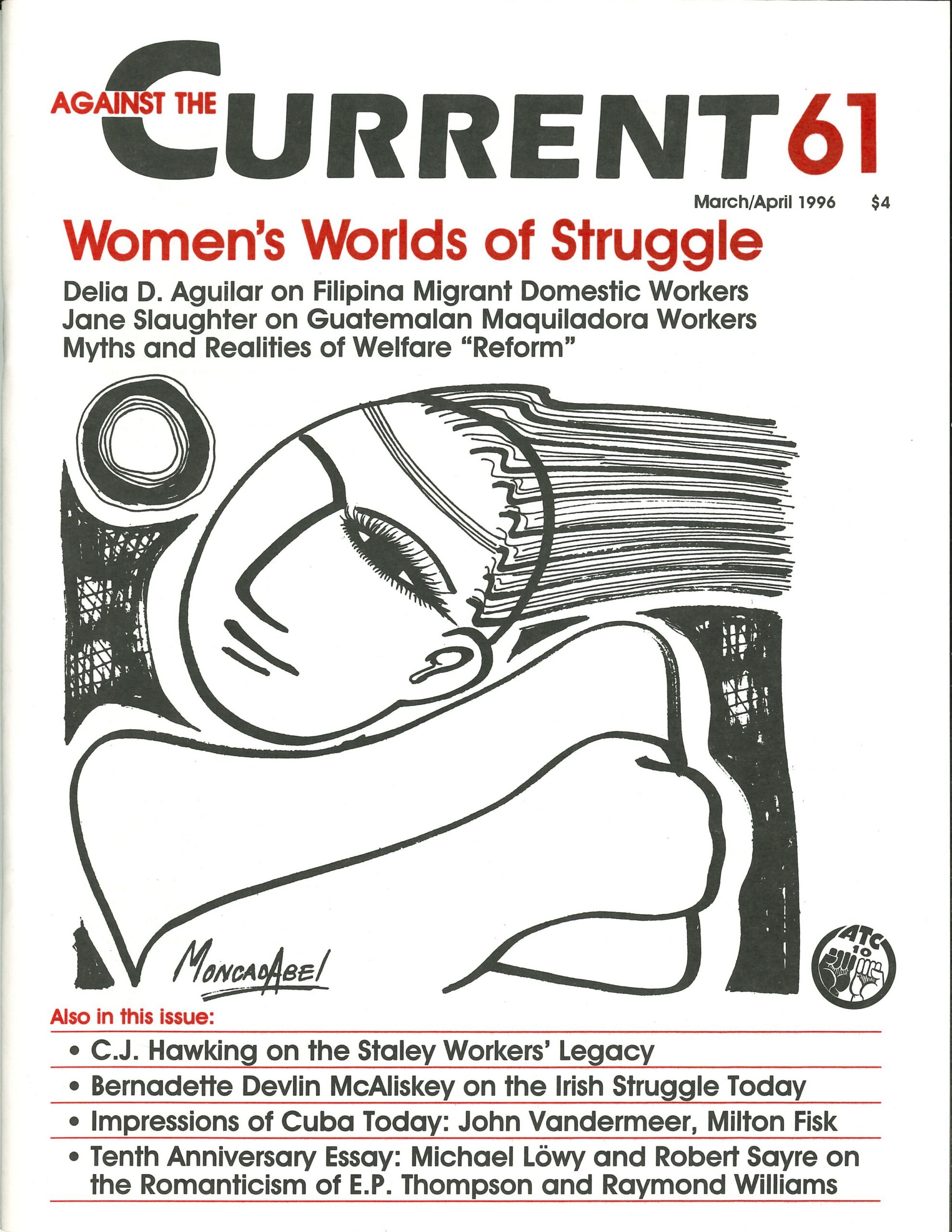Against the Current, No. 61, March/April 1996
-
NATO's Squalid Police Action
— The Editors -
Staley's Legacy of Struggle, Lessons of Defeat
— C.J. Hawking -
Detroit Newspaper Strike: A Bitter Winter
— David Finkel -
In France, A Glimpse of Labor's Power
— Mia Butzbaugh -
Reflecting on the Cuban Revolution
— John Vandermeer -
Cuba: The Party, the Market
— Milton Fisk -
An Irish Revolutionary's Challenge
— Peter Downs -
Democracy or Hibernianism?
— Bernadette Devlin McAliskey -
Structures of Discrimination
— an interview with Bernadette Devlin McAliskey - The MacBride Principles
-
Why the Ceasefire Ended
— Jim Dee -
Romanticism in the English Social Sciences: E.P. Thompson & Raymond Williams
— Michael Löwy and Robert Sayre -
Radical Rhythms: The Relevance of Rap
— Tyrone Williams -
The Rebel Girl: Blowing the Whistle on Sexism
— Catherine Sameh -
Random Shots: Kampfer's Modest Suggestions
— R.F. Kampfer - A Symposium on Imperialism Today
-
On Imperialism
— The Editors -
Imperialism and the Left
— Catherine Samary -
The Empire and Left Illusions
— Thomas Harrison - For International Women's Day
-
Servants to the Global Masters
— Delia D. Aguilar -
Guatemalan Women's New World of Struggle
— Jane Slaughter -
Main Courts, Not Just Desserts
— Jane Slaughter -
A Unionist's Life
— Jane Slaughter -
Michigan's "Welfare Reform"
— an interview with Kathleen Gmeiner -
Fighting for Our Families' Lives
— an interview with Sylvia Mitchell -
Welfare Reform, Then and Now
— Amy Hanauer - Dialogue
-
A Radical Alternative in 1996
— Eric Chester - In Memoriam
-
Christopher Columbus Alston: Organizer, Fighter and Historian
— Robin D.G. Kelley -
Alma Strowiss, Organizer-Activist
— Andrea Houtman
Jane Slaughter
UNTIL RECENTLY, THE big corporations used the poor countries mostly as sources of food and raw materials; they built their main factories at home.
Luis Galicia, a staffer at the Guatemalan research institute AVANCSO, calls his country a supplier of “desserts”–bananas, coffee, sugar. But now, says Galicia, the division of labor between rich and poor countries is changing: Transnational corporations are locating more and more manufacturing in countries where wages are low.
The future promises a global division of labor between high-tech production in the United States, Japan and Europe, and low-tech, labor-intensive work in the poor countries. (Note that high-tech production in the rich countries does not mean high-wage or high-skill jobs, as the fantasy futurists would have us believe. But that’s another story . . . )
In its 1994 book The Significance of the Maquila in Guatemala, AVANCSO writes, “The world economy is becoming global, but this does not mean that the lopsidedness of international economic relations is over. On the contrary, the lopsidedness is intensified . . . . The underdeveloped world is perfecting its role as a supplier to the developed countries. Now it contributes industrial products as well, but especially its people’s capacity to work ….
“Labor power is one of the last comparative advantages that the Third World has, given the devaluation of raw materials in international markets, and the backwardness of the Third World’s technology . . . .
“The new role of the underdeveloped countries is not simply to provide cheap labor, but rather to be functionally coupled to the transformations of capitalism and its requirements. With the growth of the maquila, the restructuring of the underdeveloped countries becomes intertwined with that of the developed countries.”
ATC 61, March-April 1996

